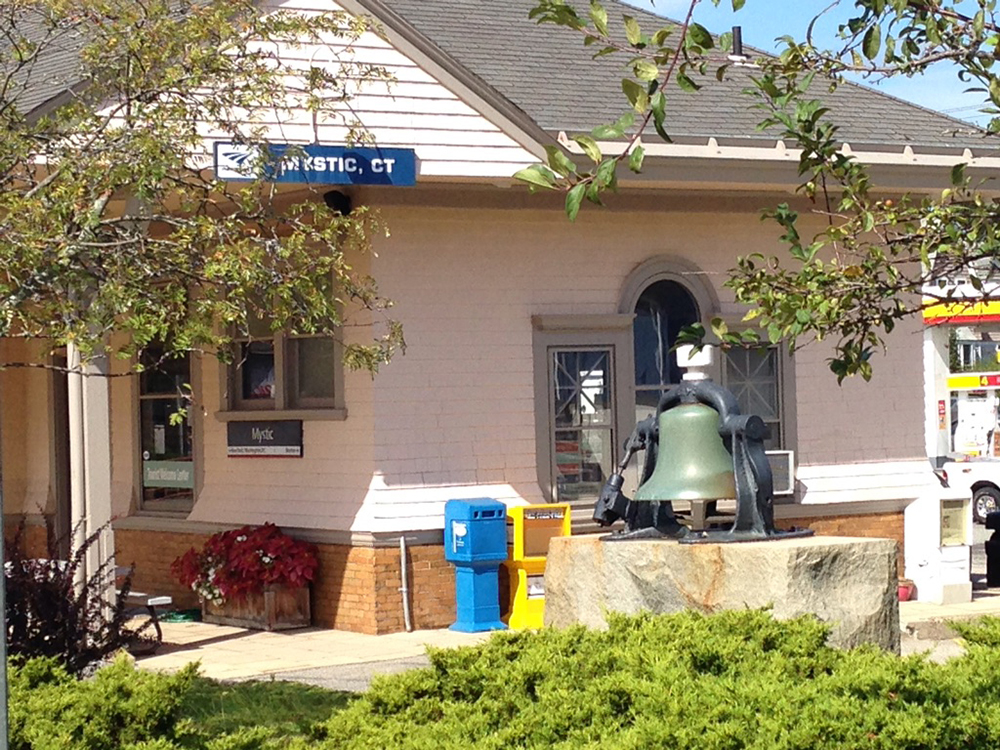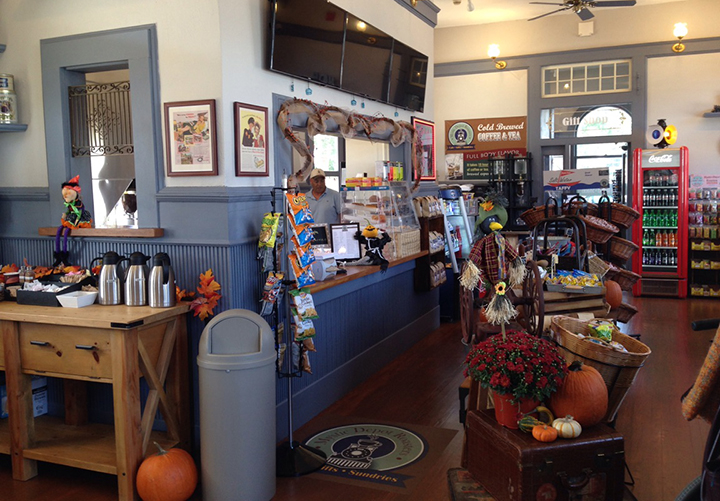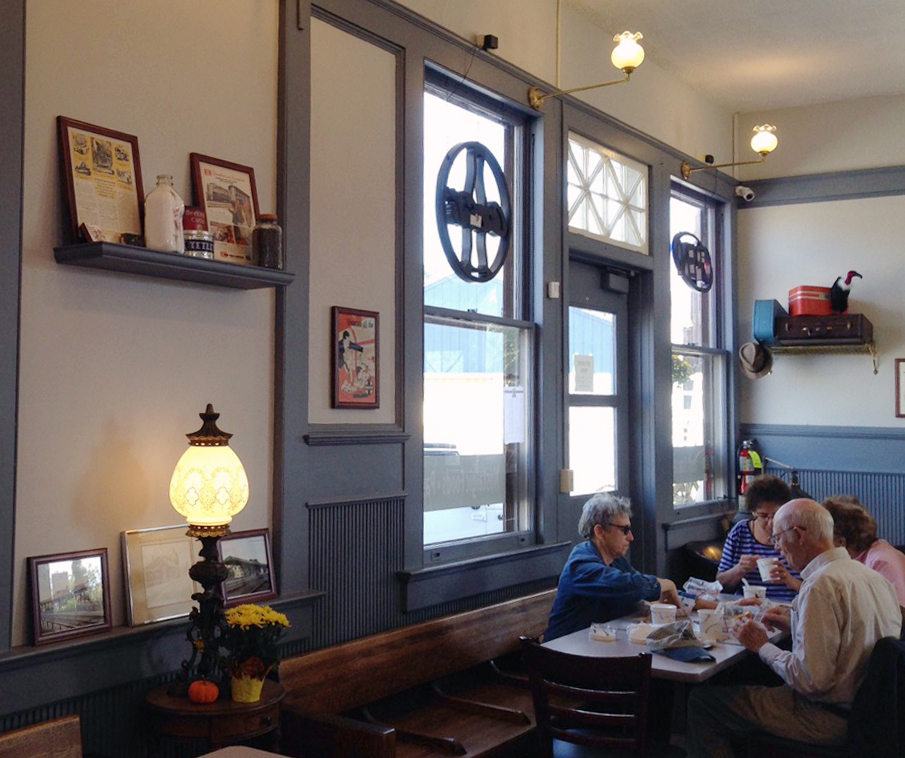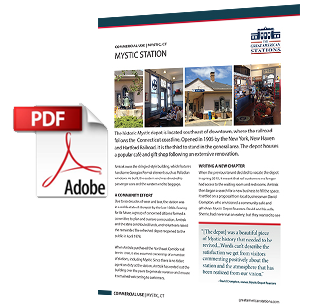The historic Mystic depot is located southeast of downtown, where the railroad follows the Connecticut coastline. Opened in 1905 by the New York, New Haven and Hartford Railroad, it is the third to stand in the general area.

New tenant Mystic Depot Roasters renovated the train station in 2016 and transformed it into a café and gift shop.
Today the depot houses a popular café and gift shop following an extensive renovation in 2016. Amtrak owns the shingled-style building, which features handsome Georgian Revival elements such as Palladian windows. As originally built, the eastern end was devoted to passenger uses and the western end to baggage.
A Community Effort
Due to six decades of wear and tear, the station was in a visible state of disrepair by the late 1960s. Fearing for its future, a group of concerned citizens formed a committee to plan and oversee a renovation. Amtrak and the state contributed funds, and volunteers raised the remainder. The refreshed depot reopened to the public in April 1978.
When Amtrak purchased the Northeast Corridor rail line in 1976, it also assumed ownership of a number of stations, including Mystic. Amtrak has rented out the building over the years to generate revenue and ensure it remains welcoming to customers.
Writing a New Chapter

The interior features a food service counter, seating area and merchandise displays.
When the previous tenant decided to vacate the depot in spring 2015, it meant that rail customers no longer had access to the waiting room and restrooms. Amtrak then began a search for a new business to fill the space. It chose a proposal from local businessman David Crompton, who envisioned a community café and gift shop: Mystic Depot Roasters.
David and his wife, Sherrie, had never run an eatery, but they wanted to see the building busy once again. “My wife and I loved the old station and the setting,” said David Crompton. “We looked at what would be right for the area, the station [and] passengers…Once we decided on a coffee roaster, we began a hunt for the best roaster we could find to produce our proprietary brands of coffee.” In a nod to its home, many of the menu items take their names from plays on railroad terms.
“[The depot] was a beautiful piece of Mystic history that needed to be revived…Words can’t describe the satisfaction we get from visitors commenting positively about the station and the atmosphere that has been realized from our vision.”
– David Crompton, owner, Mystic Depot Roasters
“Mystic Depot Roasters stimulates the kind of economic activity that Amtrak passenger rail supports and appreciates,” said Linda Frankel, Amtrak senior real estate development manager. “Amtrak is dedicated to making these types of developments happen alongside amazing partners like the Cromptons.”
Restoring a Landmark
The couple undertook an extensive rehabilitation to bring their vision to life and prepare the space for food service. They upgraded electrical, plumbing and fire protection systems, installed accessible restrooms, reconfigured the basement drainage system, patched the roof and installed an exhaust system. Work also included refinishing the floors and walls, repairing windows and painting the interior and exterior. The Cromptons also replaced the entire roof.

The décor includes historical items related to railroading. Image courtesy of Mystic Depot Roasters.
The Cromptons stayed true to the depot’s past by using historic period paints and maintaining the character of the woodwork. “We added some features such as a ticket window from a mid-west bank and luggage racks from an old rail line,” said David Crompton.
Asked to advise others considering a similar undertaking, David Crompton said: “Whatever you project for a cost, make certain you have at least three times the estimated cost in reserve. In our experience, everything ended up costing much more than the original forecast. Some of the drivers for the increase were customization…and unforeseen expense.”
Keys to Success
- Business owners considered a use for the building that would keep it active throughout the day.
- Close working relationship between Amtrak and lessee.
- Renovation retained historic fabric.
Thank you to David Crompton for his assistance with this case study.



 Amtrak established the Great American Stations Project in 2006 to educate communities on the benefits of redeveloping train stations, offer tools to community leaders to preserve their stations, and provide the appropriate Amtrak resources.
Amtrak established the Great American Stations Project in 2006 to educate communities on the benefits of redeveloping train stations, offer tools to community leaders to preserve their stations, and provide the appropriate Amtrak resources. For more than 50 years, Amtrak has connected America and modernized train travel. Offering a safe, environmentally efficient way to reach more than 500 destinations across 46 states and parts of Canada, Amtrak provides travelers with an experience that sets a new standard. Book travel, check train status, access your eTicket and more through the
For more than 50 years, Amtrak has connected America and modernized train travel. Offering a safe, environmentally efficient way to reach more than 500 destinations across 46 states and parts of Canada, Amtrak provides travelers with an experience that sets a new standard. Book travel, check train status, access your eTicket and more through the